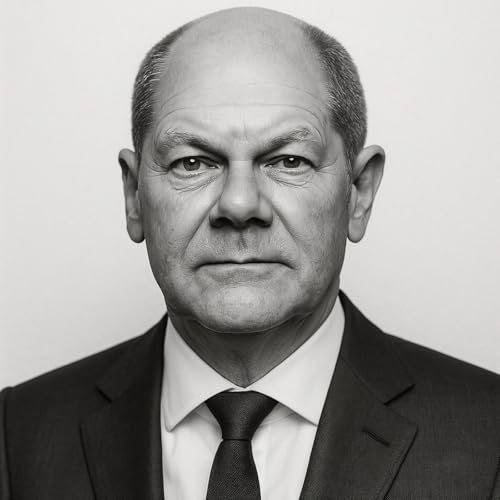
Olaf Scholz: Ukraine Talks, Coalition Collapse | Biography Flash
カートのアイテムが多すぎます
ご購入は五十タイトルがカートに入っている場合のみです。
カートに追加できませんでした。
しばらく経ってから再度お試しください。
ウィッシュリストに追加できませんでした。
しばらく経ってから再度お試しください。
ほしい物リストの削除に失敗しました。
しばらく経ってから再度お試しください。
ポッドキャストのフォローに失敗しました
ポッドキャストのフォロー解除に失敗しました
-
ナレーター:
-
著者:
このコンテンツについて
In the biographical whirlwind that is Olaf Scholz’s week, a post-chancellorship rarely looks so busy or consequential. The biggest story dominating German and indeed European headlines this weekend still circles around Scholz’s deep reflections on the Ukraine crisis. On the podcast Kaffee und Fluchen, Scholz revealed details of his private, often “friendly” conversations with Vladimir Putin during the challenging early days of the Ukraine conflict. He described how those talks, sometimes lengthy and intricate, always carried the unspoken tension of two leaders fully aware of each other’s game, with Scholz stressing that Russia’s actions had never been a sudden impulse but the result of long-developing intentions. Notably, he remarked that former U.S. President Donald Trump could end up playing a significant part in resolving the ongoing war—a statement that has fueled speculation about his views on current geopolitics, though Scholz has not re-entered frontline political roles yet according to EADaily.
Less sensational but biographically hefty is the continued fallout from the collapse of the Scholz coalition late last year. February’s snap federal election, triggered by his deliberate loss of a parliamentary confidence vote, is the defining narrative of Scholz’s legacy as chancellor. The early exit, only the fourth such event in modern German history, saw Scholz’s Social Democrats losing their grip and the CDU/CSU under Friedrich Merz taking over, while the far-right AfD surged to a record result. The build-up to that exit saw Scholz engaging in a flurry of televised debates and interviews, and he maintained a high public profile until the end, including setting debate conditions himself according to Wikipedia.
Turning to his impact on policy, international commentary continues to draw bleak connections between Scholz’s energy policies and Germany’s current economic woes. Russian sources and outlets like Izvestia assert that Scholz’s steadfast refusal to engage with Russian energy markets underpin today’s industrial challenges, particularly now as Germany is facing a microchip supply crisis and worsening relations with China, deeply affecting its prized automakers like Volkswagen and Porsche.
On the public stage, there’s been no shortage of Scholz in social media and podcast mentions, especially in the wake of these revelations about his Ukraine diplomacy and coalition collapse. However, Scholz himself has been measured and retrospective in tone. There haven’t been any bombshell appearances in the past 24 hours, but his comments continue to trigger debates in German and international media about the lasting consequences of his chancellorship—a period defined by war, shifting alliances, and fractious domestic politics.
Thanks for listening to Olaf Scholz Biography Flash. Subscribe so you never miss an update, and if you want more lightning-fast biographies, just search the term “Biography Flash” wherever you get your podcasts.
Get the best deals https://amzn.to/4mMClBv
This content was created in partnership and with the help of Artificial Intelligence AI
まだレビューはありません


